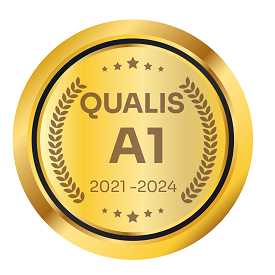Uso de las oportunidades del software messenger en educación a distancia
DOI:
https://doi.org/10.22633/rpge.v25iesp.1.14974Palabras clave:
Educación a distancia, Entrenamiento móvil, Telegram, Chat bot, Diseñador de chat botResumen
Hoy en día, el uso de la educación a distancia en el proceso educativo de una universidad está cobrando relevancia. Las condiciones actuales estimulan e intensifican el uso de herramientas de formación innovadoras, en particular, productos de software de red. En este trabajo se analizan las posibilidades y costos de utilizar diversos productos digitales en un entorno educativo. En particular, consideran el uso de soluciones digitales móviles para la educación a distancia, así como los requisitos para el desarrollo de dichas herramientas por parte de profesores que no tienen las habilidades para crear software a nivel profesional. El ejemplo de Telegram messenger describe la experiencia de usar mensajería instantánea en el proceso de aprendizaje, es decir, se creó un chat bot para organizar el control del conocimiento de los estudiantes en una institución de educación superior. El chat bot original, que se desarrolló utilizando la interfaz API de Telegram y el diseñador de chat bot Chattera, evalúa los conocimientos y habilidades de los estudiantes de la disciplina educativa de “pedagogía general y profesional”. Este estudio mostró que el potencial del mensajero no está solo en comunicación entre usuarios en forma de envío de mensajes de audio, video y texto, pero también en sus capacidades educativas.
Descargas
Citas
MILLION Users, 20,000 Stickers, Quizzes 2.0 and €400K for Creators of Educational Tests. 2020. [Electronic source]. Available: https://telegram.org/blog/400-million?ln=f. Access: 5 may 2020.
BOTFATHER web service. [Electronic source]. Available: https: //tele.gs/botfather. Access: 5 may 2020.
CHOSHANOV, M. Didactic engineering and Informatization of education. In: CHOSHANOV M. Future-oriented education-Kazan. “Fen” Publishing House, 2016. p. 119-151.
DANILOV, A. et al. Digitalisation trends and blended learning visualisation in modern digital education. International Journal of Innovative Technology and Exploring Engineering, v. 9, n. 1, p. 5109- 5111, nov. 2019. DOI: https://doi.org/10.35940/ijitee.A9207.119119
DASYUK, A. M.; VERES, D. M. Verification system of task solutions with telegram API. Scientific Outlook for the future, Odessa, v. 1, n. 14, p. 41-46, 2019.
FILONOV, D.; TUPIKIN, V. Chatbot for Telegram to help applicants. Notes on computer science and mathematics. Collection of scientific papers, Yaroslavl, p. 152-156, 2017.
IVANCHENKO, D. Managing mobile technologies in the information space of a modern University. Higher education in Russia, n. 7, p. 93-100, 2014.
IVANOV, A. D. Chatbot in Telegram and Vkontakte as a new news distribution channel. Vestnik Volga Univ., v. 1, n. 3, p. 126-132, 2016.
KRUGLIK, R. Creating a chatbot in Telegram. The postulate of the Amur state University, 2020. [Electronic source]. Available: http://e-postulat.ru/index.php/Postulat/paper/view/2839/2883. Access: 5 may 2020.
KUKLEV, V. Formation of a mobile learning system in open distance education. 2010. Dissertation (Doctor of Pedagogical Sciences) – Ulyanovsk State Technical University, Ulyanovsk, 2010.
MESSINA, C. Will be the year of conversational commerce. A Medium Corporation, 2016. Available: https://medium.com/chris-messina/2016-will-be-the-year-of-conversational-commerce-1586e85e3991. Access: 5 may 2020. (2016).
OREHIN. Telegram bot in English. Information technologies in the modern world, Yekaterinburg, p. 119-122, 2017.
POLAT, E. S. Theory and practice of distance learning. Мoscow: Publishing Center Academy, 2004. р. 416.
RUSSIA. Federal Law n. 273-FZ, of December 29 of 2012. About education in the Russian Federation. SPS Garant: Editorial from 24 abr. 2020.
RUSSIAN Market of Smartphones and tablet PCs/ J’Son and Partners Management Consultancy. 2016. Available: http://www.json.ru/ru/poleznye_materialy/free_market_watches/analytics/rossijskij_rynok_smartfonov_i_planshetnyh_pk/. Access: 5 may 2020.
TELEGRAM Bots FAQ. [Electronic source]. Available: http://core.telegram.org/bots/faq. Access: 5 may 2020.
TELEGRAM Homepage. 2020. [Electronic source]. Available: http://telegram.org. Access: 5 may 2020.
Publicado
Cómo citar
Número
Sección
Licencia
Derechos de autor 2021 Revista on line de Política e Gestão Educacional

Esta obra está bajo una licencia internacional Creative Commons Atribución-NoComercial-CompartirIgual 4.0.
Manuscritos aceitos e publicados são de propriedade da Revista on line de Política e Gestão Educacional. É vedada a submissão integral ou parcial do manuscrito a qualquer outro periódico. A responsabilidade do conteúdo dos artigos é exclusiva dos autores. É vedada a tradução para outro idioma sem a autorização escrita do Editor ouvida a Comissão Editorial Científica.











